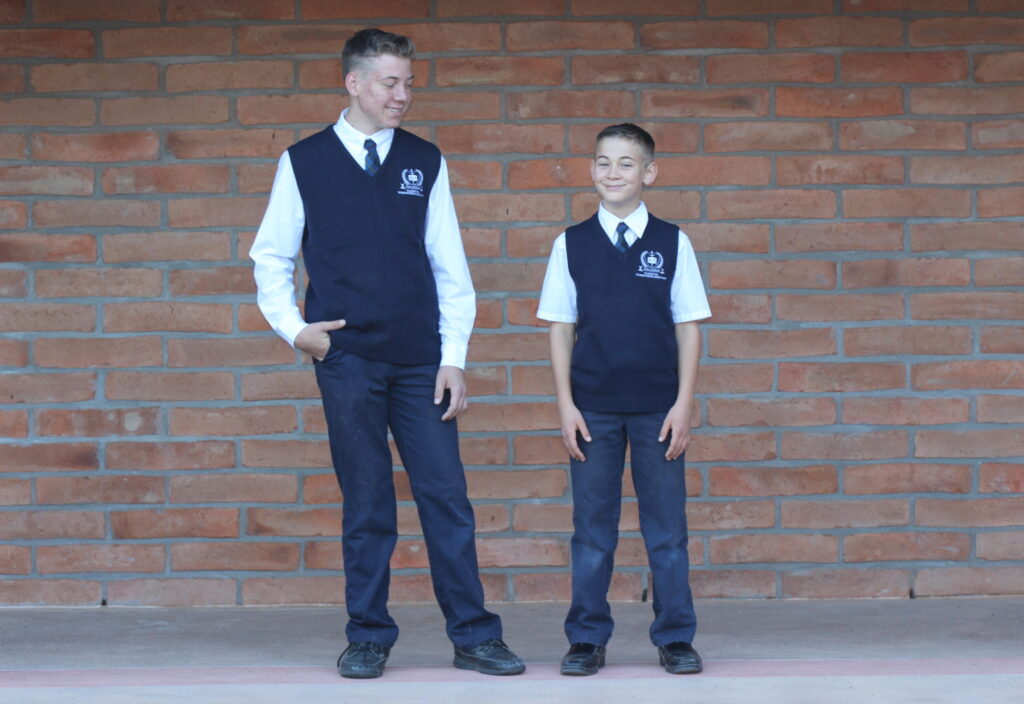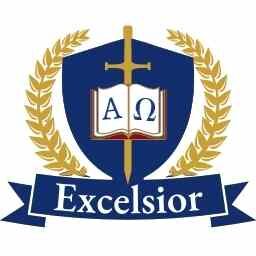
Curriculum
We use a variety of curricula, Memoria Press being one we use frequently. It is a classical Christian curriculum and their Latin is the best of all that is out there. We have enjoyed it greatly. Their composition, logic, grammar, and literature is also exceptional. In 8th+ we use Apologia Science for its conservative Christian worldview. For whichever classes you enroll in you will receive a book list. You can order through Excelsior or find the items on your own. We try to keep the book list small. In many classes all they will need is a notebook. In Apologia science classes it is imperative to have the newest editions (as the older editions are completely different).
The Role of Excelsior in Your Homeschool
Excelsior exists to provide accountability (in the form of moving through the curriculum together and “done-for-you” checklist lesson plans) as well as community, to provide fun and engaging classroom time where students will learn to love and enjoy their subjects and make lifelong friends.
Excelsior serves to empower parents to be the primary teachers (which is the state of Arizona’s definition of homeschooling). We usually won’t use class time to proctor tests (we leave that to the parents at home if they desire). All assignments are optional and suggested, we leave that to the parent’s discretion. If a student demonstrates mastery in that week’s lesson, perhaps they do not need to do the homework assignment and that is the parent’s prerogative to choose what serves their child’s time best. We give no grades at Excelsior (with the exception of Composition, students may turn their final drafts into their teacher for their critiques and a grade).
It is important to note, there are some subjects we won’t cover altogether and we leave them for you to do at home (such as Math – we play Math facts games in Primary School and then in the Grammar and Upper Schools we leave Math for home). In other subjects you will primarily be the instructor (such as Composition – we will teach the first two days, but either you, or the DVD video instructor, will teach the remaining days. The students are expected to come ready and have completed the assignments the previous week so that they can continue on. And there are some subjects that we cover completely at Excelsior and require no at home time.
Upper School
7th through 12th grade is what we call our Upper School. It is a time when they build on all they have learned in previous years and begin the processes of thinking logically in their writing and oration, working towards developing excellent rhetoric (the ability to speak and write well and persuade). They will achieve mastery in 1-3 classical languages through which they will develop their minds and have a thorough understanding of the English language.
To honor this time in life, and all that they have accomplished we give them an advancement ceremony at the beginning of the year where they receive their new uniforms. The Upper School students are given blazers and the girls now wear a new uniform, trading in their jumpers for skirts, Peter Pan collars for Oxford shirts, and Mary Janes for Penny-loafers. All of the children are excited for this important milestone when they graduate from Grammar School to Upper School.
We typically don’t refer to students by “grade” but refer to the classical model of students working in levels based on their abilities. No two students will learn the same or at the same time. There are students who are advanced and parents can opt to choose classes that fit best for them (such as grade level higher or the option to go to a lower grade where appropriate is fine too).
Our fervent desire is to serve and bless the families at co-op. We achieve this goal by completing an entire day of instruction in core subjects. As added accountability and to make homeschooling as simple as possible, you will be given a lesson plan checklist that takes you through the curriculum week by week. And the best part is we do the curriculum together, in community (and we have a lot of fun!)


High School Sample Coursework
(suggested 27 credits for graduation)
| 9th | 10th | 11th | 12th |
| Theology and Classical Studies I | Theology and Classical Studies II | Theology and Classical Studies III | Theology and Classical Studies IV |
| English I:Composition, Logic I & II, Literature & Poetry | English II:Composition, Material Logic, Literature & Poetry | English III:Composition, Divine Comedy | English IV:Composition, Classical Rhetoric, Literature & Poetry |
| Math (Algebra I or higher) | Math | Math | Math |
| Latin (First Form or higher) | Latin | Latin | Latin |
| PE* | Art* | Greek | Hebrew |
| Biology | Chemistry | Physics | Advanced Science (ex. AP Biology) |
| Renaissance and Reformation History (1300-1600AD)** | Medieval History (300AD-1200AD)** | World History (1600AD to late 1980s) | American History (1615AD-1980s) |
| Suggested SAT prep prior to Oct of Jr year if want to compete for National Merit Scholarship |
*Subjects can be combined over four years if only once a week.
***From 7th-10th in History and Classical Studies (the Bible, Ancient World, Ancient Greeks, and Ancient Romans) we will have covered a majority of the Western World’s most important history.
Note: Government:
- If your wishlist college requires Government consider doing Teen Pact for four years–it counts as government credit. Alternatively, you can take a summer school class during the summer going into Senior year – such as a summer dual enrollment/concurrent at ACU for low cost: (ex they offer HIS 212 7/4-8/28 for $195)
Pay attention to college requirements of which college you are attending – they all have different requirements. This suggested course above is considered rigorous and would satisfy any college, even the most difficult. But if your child attends a less rigorous college you could opt out of some course and do more electives.
Upper School Course Outline for Theology/Classical Studies, English, and History
Theology and Classical Studies 7th-12th:
The cornerstone of our Theology and Classical Studies is reading the Bible. The students will be encouraged to read the entire Bible by graduation.
7th:
Bible Study and Memorization, Famous Men of Greece History, Greek Alphabet, Horatius at the Bridge Poetry/History/Geography Study (an epic poem of 70 stanzas we learn and memorize over the course of the entire year, at the end the children receive a medal, pin, and certificate and are inducted into the Horatius Society)
8th:
Bible Study and Memorization, Ancient World through Ancient Greeks History
9th:
Bible Study and Memorization, Ancient Roman History, History of Christianity (Jesus’ birth through Modern times, reading many primary sources)
10th:
Bible Study and Memorization, Greek Tragedies, History of the Early Church (Primary Church Father Writings, Eusebius’ History)
11th:
Bible Study and Memorization, The City of God by St. Augustine, The Republic and the Laws & On Obligations by Cicero
12th:
Bible Study and Memorization, A Shorter Summa (essential passages of Thomas Aquinas) by Peter Kreeft, Orthodoxy by G.K. Chesterton, Mere Christianity by C.S. Lewis, The Westminster Catechism
—————————————–
English 7th-12th:
7th
Composition (See Upper School Class Schedule for details and correct progression), Literature Course: The Trojan War, Anne of Green Gables, The Bronze Bow, The Hobbit + Poetry + Spelling (last year), Grammar IV
8th
Composition (See Upper School Class Schedule for details and correct progression), Literature Course: Treasure Island, The Wind in the Willows, As You Like It, The Adventures of Tom Sawyer + Famous American Poetry and Short Stories + Grammar V (last year of English Grammar)
9th
Composition (See Upper School Class Schedule for details and correct progression), Literature Course: Beowulf, Sir Gawain and the Green Knight, The House of Baskervilles, A Midsummer Night’s Dream + Old English and Medieval Poetry, Prose, and Drama, and Classical Logic I & II
10th
Composition (See Upper School Class Schedule for details and correct progression), Literature Course: Romeo & Juliet, The Scarlet Letter, Julius Caesar, Pride & Prejudice + The Elizabethan – Neoclassical Age Poetry and Prose, Material Logic
11th
Composition (See Upper School Class Schedule for details and correct progression), The Divine Comedy, Henry V
12th
Composition (See Upper School Class Schedule for details and correct progression), Literature Course: A Tale of Two Cities, Hamlet, Macbeth, Anna Karenina +The Romantic to the Victorian Age Poetry, Classical Rhetoric
—————————————–
History/Social Studies 7th-12th:
7th
200 Questions About American History
Primary Source Readings
Guerber’s 13 Colonies and the Great Republic
Story of the World IV
8th
World Geography III (and brief Review of Geography II)
9th
Renaissance and Reformation History (1300-1600AD)
10th
Medieval History (300AD-1200AD)
- From 7th-10th in History and Classical Studies (the Bible, Ancient World, Ancient Greeks, and Ancient Romans) we will have covered a majority of the Western World’s most important history.
- Note: If your wishlist college requires a “World History course” consider adding a summer study of 1200AD-current times of major events around the world outside of Europe (We will thoroughly cover European history in 9th-11th grades).
11th Modern European History (1600AD to late 1980s)
- Part I Covers: Western European and American societies from 1600-1815, exploring themes such as the right to claim power and govern others, the role of religion in society, and the common elements of long-lasting cultures, the Napoleonic Age (1815) to the Cold War (late- 1980s).
- Part II includes the effects of industrialization on European nations, the unstable balance of power between Britain France, Russia, Prussia, and Austria-Hungary, the creation of Germany and Italy as sovereign nations, the Russian Revolution, World War I and its effects on Europe, the collapse of the world economy, the rise of Fascism in Italy, and National Socialism (Nazism) in Germany, and World War II and its effects.
12th United States History
- Part I–Pre-1615 life in North America through the post-Civil War Reconstruction years, ending in 1877. This includes early European explorations, the colonial period, the founding of the United States, the Revolutionary War, the development of our government, and the principles upon which it is based, the expansion of our national borders, the War of 1812, the development of political parties, the Mexican War, and the Civil War, along with its causes and results. Social, economic, and political issues are addressed throughout the book.
- Part II–Covers the end of Reconstruction (1877) to the Reagan years (1980s). This includes the industrialization of America, the Gilded Age, the settlement of the West, the increase in immigration, the Progressive Era, World War I and its effect on American society, the Great Depression, World War II and its effect on American society, post-war years of prosperity, the Cold War and Communist threat, the Korean War, the Vietnam War and troubles in Southeast Asia, and the beginning of problems in the Middle East. Social, economic, and political issues.
Curriculum:
Below are links to see the Memoria Press curriculum. The only subjects not present that we have used are Apologia Sciences (found on Apologia’s website).
7th grade:
This is the 7th grade curriculum we use.
8th grade:
This is the 8th grade curriculum we use.
9th grade:
This is the 9th grade curriculum we use.
10th grade:
This is the 10th grade curriculum we use.
11th grade:
This is the 11th grade curriculum we use.
12th grade:
This is the 12th grade curriculum we use.
